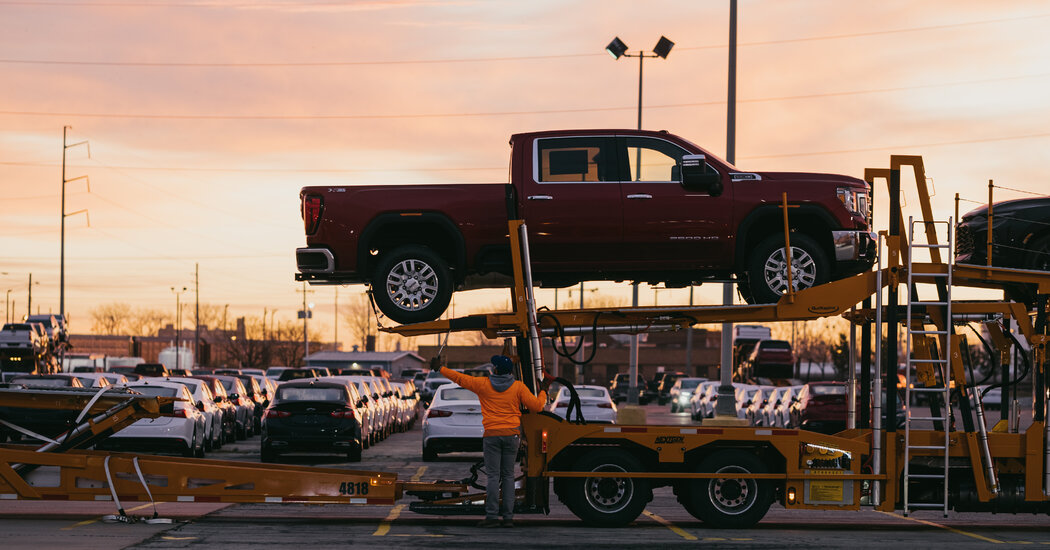
KANSAS CITY, Kan. — Just after 5:30 on a chilly November morning, David Heide arrives at the shipping terminal on the industrial fringes of Kansas City, Kan., wondering what fresh torment the day has in store.
His company, Jack Cooper Transport, delivers new cars to dealerships from auto factories around the United States. It carries some on tractor-trailers, and sends more by rail.
Before the global supply chain descended into chaos, the terminal ran on a steady and dependable rhythm. Roughly once every minute, a new car emerged from the General Motors Fairfax factory next door and landed in the terminal parking lot. Rail cars brought in a predictable influx of vehicles from other G.M. factories. Mr. Heide, the Fairfax terminal manager, could deploy drivers and yard crews with assurance.
No one uses words like predictable these days. As Mr. Heide traverses the darkened yard, he has no idea how many rail cars the short-staffed railroad has sent out, or how many vehicles G.M. will place on hold. He does not know if there will be enough work for the crew he has summoned this week.
“It’s been real crazy for a lot of terminals,” Mr. Heide says.
The Great Supply Chain Disruption has turned shipping terminals into volatile zones full of uncertainties and best guesses. Nearly two years into the pandemic, reliable planning is still next to impossible at every point of the supply chain. No one is fully in control of their own circumstances, nor can they divine the fortunes of their suppliers, distributors and customers. The result is a feedback loop of variability that impedes efforts to turn the economy back on after the virus shutdowns.
The Fairfax terminal highlights a troubling reality in the global economy: So many unknowns dog the supply chain that any semblance of normalcy remains far-off, even as some of the chaos abates and shipping prices edge down.
Between February and September, G.M. largely halted operations at its Fairfax plant owing to a critical shortage of computer chips — a key element in contemporary cars. The plant is producing again, running one shift instead of its previous two or three.
Still, like the rest of the trucking industry, the terminal is scrambling to recruit truck drivers in anticipation of an eventual flood of new vehicles. For now, Mr. Heide is resisting pressure from G.M. to move faster.
What to Know About Inflation in the U.S.
“Their expectations are that you can just flip a switch and there’s 20 drivers,” says Mr. Heide, 49. “Then I’m stuck paying 20 people who have nothing to do.”
Not that G.M. is the culprit. The automaker is contending with its own logistical problems.
“Our customers are not trying to be a pain in the butt,” says Sarah Amico, executive chair of Jack Cooper Holdings Corporation, which owns and operates the Fairfax terminal along with more than 30 others in North America. “Their realities are changing, too. The supply chain is being remade in real time.”
Inside the terminal, next to the dispatch desk, a half-dozen drivers sit at wooden picnic tables under fluorescent lights, arranging their morning hauls. Using tablet computers, they scan the available assignments, each labeled with the applicable pay, which is based on how many miles they must drive from the terminal to the destination. They pick in order of seniority.
Dave Pinegar has already been on the road for three hours, having driven here from his home in Wichita, Kan., nearly 200 miles to the southwest.
“The early bird gets the worm, man,” he says.
He scrolls through the options. A run to Broken Arrow, Okla., would earn him $452, while a longer journey to Malvern, Ark., would bring $717. The longest route — a 641-mile trip to Batavia, Ohio — would pay $929, but would keep him away from his wife and two daughters for at least one night.
He selects a trip back to Wichita, which pays only $299. Absent any drama, he will be home by midday.
Mr. Pinegar’s cargo illustrates the complexities of the supply chain.
First, he will stop at a dealership in Emporia, Kan., dropping off three Chevy Trailblazer S.U.V.s built at a factory in South Korea. Then, he will continue to Wichita bearing two Chevy Malibus from the Fairfax plant, and a pair of Cadillacs — a CT5 sedan made in Lansing, Mich., and an Escalade S.U.V. produced near Fort Worth, Texas. Finally, there is a blue Chevy Silverado pickup truck built in Mexico.
“Such a long journey,” says Mr. Pinegar.
Sometimes, he confronts angry dealers, steaming over how long it has taken for the cars to arrive. But in recent months, as the chip shortage has turned cars into precious commodities, he is frequently greeted by applause, and even people videotaping him as he unloads.
“I feel like I’m Santa Claus,” he says.
Out in the yard just after 6 a.m., as the first glimmers of light seep through a leaden sky, Mr. Pinegar begins driving his assigned vehicles up the ramp of his trailer like a circus trick. Then he rolls through the gates and disappears down the interstate.
If anything goes awry out there, the margin for error has shrunk.
The previous week, one of Mr. Heide’s tractor-trailers developed a leaky radiator and broke down outside Elkhart, Ind. — 582 miles from Kansas City.
The company had the truck towed to a local repair shop. In normal times, the driver would have waited there for the radiator to be replaced. But the shop did not have a radiator, and could offer no assurances on how long it would take to get one.
Mr. Heide had a decision to make. He could have left his driver in Indiana, gambling that the radiator would come in by the end of the week. But he knew that car parts were stuck inside shipping containers on cargo vessels marooned off ports from Los Angeles to Savannah, Ga. He had no idea if the repair shop had enough people to manage the job, or if the parts distributor had enough drivers to deliver the radiator quickly.
And he risked paying several days of motel lodging for his driver while the load sat undelivered.
So Mr. Heide told his driver to rent a car and come home. He arranged for another driver based at a Jack Cooper terminal near St. Louis to go and rescue the load and deliver it to its final destination in Ohio.
Born and raised in the middle of Kansas, Mr. Heide played catcher on his college baseball team. He walks the terminal with the jovial confidence of someone accustomed to issuing directions, while accepting relentless if good-natured ribbing.
Understand the Supply Chain Crisis
But he can’t mask his frustration over having to deliver results in a system dominated by factors that are beyond his control.
The previous week, General Motors told him that it was planning to release nearly 700 vehicles, with the expectation that Mr. Heide would deploy 12 workers in the yard to load rail cars.
Instead, Mr. Heide opted for a cautious approach, anticipating — correctly — that roughly one-fifth of the newly released cars would be put on hold. He brought in only six yard workers. He was intent on not absorbing the costs of idle hands.
The terminal’s assistant manager, Phil Rose, spends much of his day inside a windowless office staring at a spreadsheet detailing the inventory of vehicles. This morning, the spreadsheet shows that 1,700 cars produced inside the Fairfax G.M. factory are parked out in the yard.
He is looking for blocks of nine or 10 cars bound for destinations on one logical route. The more cars, the easier the exercise. But with the G.M. plant running only one shift, production has been choppy. Some days, the terminal sends out more than 200 cars by truck; other days only 60.
“This thing is built for three shifts, all out,” Mr. Heide says.
Mr. Heide assumes that normalcy lies ahead. He is intent on ramping up, even as the uncertainty about supply undermines his efforts. He is expecting five new trucks, but the same chip shortage afflicting the rest of the auto industry means that he is likely to have to wait at least six months.
On top of it all, he and his colleagues are short on drivers and must recruit 15 more, an exercise that feels futile.
“It’s horrible,” says Lindley Davis, the company’s Atlanta-based head of human resources. “People want to be home. They don’t want to be driving a truck.”
Jack Cooper is one of only two union-represented companies left in the car hauling industry. It pays training wages reaching $90,000 a year, plus pension and health benefits for which the company covers all of the premiums. The company has been handing out $10,000 signing bonuses.
Still, takers are few.
On a call with her team of recruiters, Ms. Davis hears reports of applicants “ghosting” — disappearing incommunicado — or taking other offers. One driver who accepted a job offer backed out after his employer tripled his salary.
Mr. Heide finds himself contemplating two unpalatable options: He could lower his standards and accept that people who would ordinarily not make the cut will drive off his yard carrying a $1 million load of cars. Or he could hold the line but risk not having enough drivers when production rises.
He’s aiming for a middle ground, bringing in people with unimpeachable experience but flags that might have disqualified them, like too many different jobs in a few years.
Just before 3 p.m., as afternoon sunshine glints off the windshields in the yard, Mr. Heide learns that only 127 vehicles have come in by rail today, and only 50 are coming in tomorrow.
“That’s nothing in terms of getting good inventory in to build loads,” he says.
He sent five drivers across the Missouri River to another Jack Cooper terminal next to a Ford plant to work off its backlog.
Mr. Heide sits down at his desk, surveys his email and braces himself for whatever comes next.







